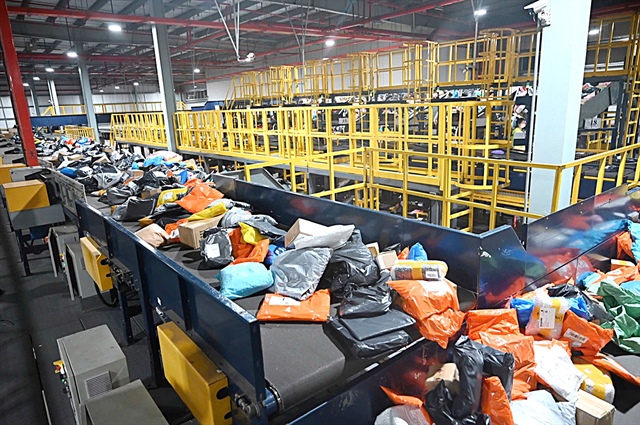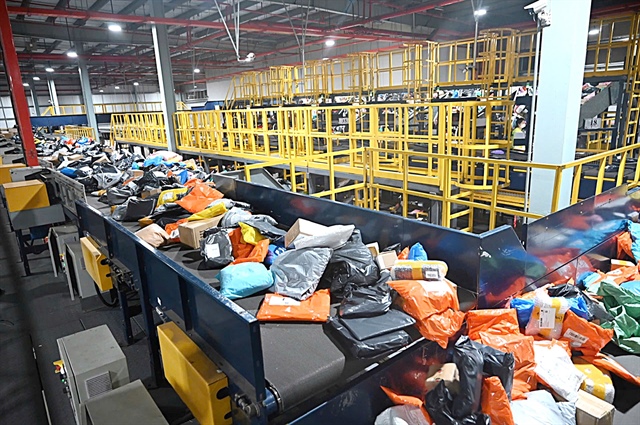Vietnam ending tax exemption for low-value imports gives local businesses competitive edge
Vietnam ending tax exemption for low-value imports gives local businesses competitive edge
While online retailers relying on cross-border e-commerce brace for price hikes after Vietnam officially scrapped the tax exemption for imported goods valued under VND1 million (US$40) sent via express delivery starting this Tuesday, domestic manufacturers are seizing the opportunity to compete on a more level playing field.

Chinese businesses have invested heavily in logistics facilities to enhance their competitive edge. Photo: Bong Mai / Tuoi Tre |
Previously, imports under VND1 million were exempt from value-added tax (VAT) and import duties, while locally-produced equivalents remained taxed.
This loophole allowed e-commerce sellers to import cheap goods in bulk – mainly from China – then split orders to exploit tax exemptions, putting significant pressure on domestic small- and medium-sized enterprises.
The new tax rule, introduced under the Vietnamese government leader’s Decision No. 1, aims to correct this imbalance.
Online retailers, cross-border sellers feel the impact
For online sellers like Quynh Tran, who has been running an e-commerce business in Ho Chi Minh City’s Binh Thanh District for nearly eight years, the policy change is a major shift.
“Most of my products are small-ticket items imported from China via e-commerce platforms. With the new tax, prices will rise, so I’m considering sourcing more domestic alternatives,” she said.
Many shop owners on e-commerce platforms feared that price increases will deter customers, leading to a decline in sales.
However, some acknowledged that their struggles predated the policy change, with cheap Chinese imports having already driven many local businesses to the brink.
My Thanh, an online fashion retailer in Dong Nai Province, invested over VND200 million ($7,800) in women’s clothing, only to see weak sales due to cut-throat competition from low-cost Chinese alternatives.
Aside from fashion, other items like household goods, accessories, stationery, and cosmetics are also heavily impacted.
Even influencer-led brands are feeling the squeeze.
Earlier this month, Linda Ngo, with over 5.5 million followers on short-video app TikTok, announced the closure of her fashion brand, Lenoir Studios, citing time constraints.
But some customers noted that while her designs were stylish, they were priced too high compared to similar imported options.
E-commerce analytics firm Metric reported that about 165,000 online shops across five major platforms exited the market in 2024.
Meanwhile, on Shopee alone, foreign sellers accounted for more than VND14.2 trillion ($555.9 million) in revenue, selling over 324 million products – without factoring in sales from TikTok Shop, Lazada, Tiki, and Sendo.
A boost for local businesses
Experts said that the new tax regulation will push domestic businesses to reassess their operations and enhance competitiveness.
Economist Dinh Trong Thinh from Vietnam’s Academy of Finance emphasized that taxing low-value imports allows domestic companies to review and optimize their operations.
Nguyen Huu Huan, a senior lecturer at the University of Economics Ho Chi Minh City, believed the change promotes tax fairness while curbing tax losses from the surge in small-value imports.
However, he noted that additional support measures are needed to help local businesses compete with China’s massive-scale production and cost advantages.
Bui Duc Thien, co-founder and CEO of fashion brand Erosska, welcomed the decision, calling it a necessary step to close an “unfair loophole.”
“The previous tax exemption created an uneven market where e-commerce sellers could import low-cost goods, split shipments, and avoid taxes, making it impossible for local producers to compete on price,” Thien said.
|
|
| Chinese goods are shipped to Vietnam via low-cost delivery services. Photo: Bong Mai / Tuoi Tre |
Aligning with global trade policies
Vietnam is not alone in making this move.
Several years ago, European countries identified the challenges posed by tax-free cross-border e-commerce and introduced VAT on all imported products, regardless of value.
This policy aimed to protect domestic businesses and prevent them from losing ground in their home market, said Nguyen Dinh Tiep, chairman of 2TS Online Services Company.
He pointed out that Vietnam has been missing out on significant tax revenues.
In March 2023 alone, around 4-5 million small parcels were shipped daily from China to Vietnam, with an average value of $45-65 million per day.
By not taxing these shipments, the Vietnamese government lost an estimated VND50-75 billion ($2-3 million) in VAT and import duties per day, he said.
Possible shift in Vietnam’s e-commerce landscape
The tax change is expected to reshape Vietnam’s e-commerce landscape.
Nguyen Anh Tuan, strategy director at J&T Express Vietnam, expressed his belief that international sellers will now reconsider their logistics strategies.
“Instead of shipping individual parcels directly from abroad, businesses may start importing in bulk via container shipments – slower but cheaper – or even set up local warehouses,” he said.
The shift could prompt foreign brands to establish distribution hubs in Vietnam, reducing costs for domestic buyers while creating new logistics opportunities.
The policy could also impact the direct-to-consumer model, in which manufacturers sell directly to customers without intermediaries.
"It remains to be seen whether e-commerce will continue favoring direct international shipments or revert to using local distributors.
"But one thing is clear – Vietnamese brands will now have a better chance to compete against imports that were previously tax-exempt," Tuan said.
- 17:15 21/02/2025

























